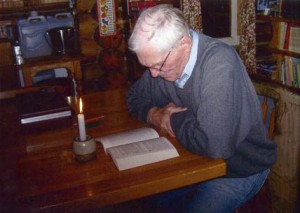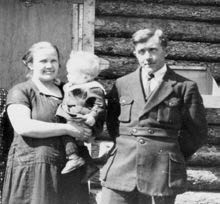The following article was taken by from the collection:
Along The Way
Permission given by John Wiens
More stories from Along the Way by John Wiens:
Preamble
THE STORY OF TWO MOTHERS
She was only sixteen when he had asked her to marry him. Margaret Wiebe was an orphan. Her mother had died when she was only ten. Her father was ill at her mother’s funeraland died soon after. She also had lost some of her siblings to consumption, a terrible disease that had raged in her family, and had robbed her of a happy childhood and her teenage years.Although the Hamm family was adopting her, she sadly missed her own family.
John Friesen had not only asked Margaret to marry him, he also had asked her to comewith him to another world, to Canada. He was offering to take her away from the Ukraine, a country embroiled in anarchy, and terrorized by revolutionaries. Above all, John was offering her a new future, a new life, far away from the place where she had experienced so much sadness in her young life. She loved John and she agreed to marry him and go with him wherever his adventurous spirit would take them.John’s sisters and their families were migrating to Canada, John and Margaret were going with them, and so in that same year of 1925 they left their old homeland behind, a country in turmoil. They departed with high hopes, and the anticipation of a new life in a new country, and a new family, Margaret was pregnant.
When they arrived in Montreal, Margaret was having chills. In spite of John’s objections, ruthless customs officers subjected her to go through an ice cold shower. It took Margaret a long time to recover from that experience and to regain her normal body heat. It concerned John. Was this the onset of that terrible disease that had raged in her parental home and destroyed her family?
When they finally arrived in Manitoba, John was restless. He had heard of land being allotted free to immigrants, by the Ontario government and the CN railroad company, in the Northern wilderness of Ontario. After their son Peter was born, in July 1925, they accepted that challenge and came to Northern Ontario. They acquired a 75-acre homestead, andwith the assistance of neighbour settlers, established their little log home. John had lots of work, cutting pulpwood in the black spruce forest that covered his homestead and the whole surrounding area.
Here he was earning enough money to make a living for his family, and even enough to eventually pay off some of his debts. John and Margaret cleared some land for a small garden. The work was hard and although they had to put up with mosquitoes and black flies, cold winters and deep snow, they still enjoyed pioneer life in their small cabin with little Peter. They enjoyed socializing with their neighbours and the community life of the new settlement of Reesor. Margaret loved John and little Peter. Both she and John had an adventurous spirit. They enjoyed the northern Wilderness. After several years she again became pregnant. She had hoped after the good health that she was enjoying, the terrible disease that had raged and destroyed her childhood family, had stayed in her old homeland and would not haunt her anymore. It was not to be. She knew the symptoms, when she coughed up some blood, she did not tell her husband, but John knew. He was concerned.
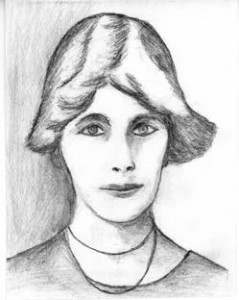
A portrait I sketched of her from a small photograph on her passport.
It was spring, a beautiful time, after a long cold winter. The snow and ice had finally thawed. Choruses of frogs were singing in nearby swamps and creeks. The treetops of poplars and birches were showing their fluorescent green against bright blue skies, and the birds were returning with their cheery songs. It was a wonderful time of renewal. It was in the middle of May 1928, also a time for Margaret to deliver her baby. Mrs. Jansen had been staying with them, to help with the birth. Although John was worried, every thing went well. Little Peter now had a baby brother. Margaret named him Johnny, after the husband she so dearly loved. This should have been a happy time in the Friesen home, but not all was well. Margaret was ill. She had coughing spells, causing blood to come up into her mouth. John knew she needed medical attention. There was no hospital nearby, and besides, he did not have the money to cover the extended care that Margaret needed. The whole Reesor community was concerned along with John. Mr. Thomas Reesor had heard the sad news of the Friesens. He too was concerned. Mr. Reesor was the founder of this community at Mi. 103 on the CN Railroad north west of Cochrane. He was a member of the Board of Colonization under the leadership of David Toews. He also was a member of the Markham Mennonite Church near Toronto, a modest, benevolent community that was active in helping the settlers getting established, by supplying them with used furniture, clothing and other necessary items.
He came to visit John and Margaret and told them to immediately make arrangements with their neighbours to keep their children, and then to travel to Toronto and have Margaret admitted into Toronto General Hospital. He then handed them the railway fares that he already had purchased. When they arrived in Toronto a delegation of Markham people met them and had Margaret admitted to a hospital bed. The next day they got John a job as a carpenter on the construction of a church building, enabling him to stay close to his ailing wife, while also earning some much needed money.
Little Peter and baby Johnny stayed with neighbours, the Schmidts and the Klassens. After some time in the hospital Margaret realized her health was not improving. She was only too well aware of what the illness she was suffering from had done to her parents and to some of her siblings. Margaret knew she was dying. At the moment, back in Reesor, her children were with caring people, but when John would come back to the homestead without her, it would be impossible for him to look after both of them, especially the baby, while at the same time work in the bush to earn a living. She prayed for John, little Peter and baby Johnny. Then she remembered something that had happened a year and a half earlier, back in Reesor: The death of a newborn baby boy, several days old. It was the firstborn baby of Jacob and Anna Wiens. The baby had breathing problems. Because of deep snow between Christmas and the New Year (1927) and many other logistical problems at the early time of the new community, it had been next to impossible to get any kind of medical attention for their baby. Since there still was no local cemetery, their baby had been buried on a small hill behind their home under an evergreen tree.
Anna was still grieving the loss of her baby, when she received a letter from Margaret Friesen. Tears welled up in Anna’s eyes when she read the letter. “Dear Anna, there is little hope of me ever recovering from my illness. My baby, my little Johnny needs a mother. Anna, you your baby. Please Anna, have mercy on my baby. Take him and love him as you would your own.
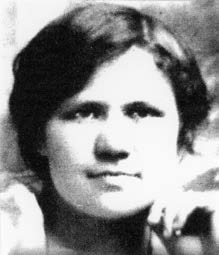
The mother that adopted me, raised me and loved me.
Johnny was six months old when he became the child of a new Mom and a new Dad, with whom he bonded very quickly. Three months later Anna gave birth to a healthy baby boy. Johnny now had a new brother. His name was Walter. A few years later another brother, Victor was born into the Wiens family. Johnny grew up in a very loving and caring family home.
It was a few days later after she had written the letter to Anna, that Margaret died in the Toronto hospital. The funeral was held in the Markham Mennonite Church. She was buried in an unmarked grave in a cemetery beside the little church. May this narrative serve as a memorial to the courage and fortitude of her sojourn and life here on Earth.
This is the story of my two mothers: Margaret, who bore me and Anna who raised me, both a great blessing to me. I loved both of them.
As I grew up in the community of Reesor, it sometimes seemed to me that there were people who were somehow interested in me. I sensed, what I was sure, was some quite undeserved friendliness and kindness from them. It was much later in my life that I realized that indeed, it had nothing to do with any merits that I may have earned, but rather the concern of a caring community for one of two little boys who had lost their mother so early in their lives.
When John Friesen returned back to Reesor, from Toronto and the funeral in the Markham church, he took little Peter back into his care. John was concerned about him and his health. He took him to the hospital in Hearst, where the doctor suggested that Peter had the early symptoms of tuberculosis.(consumption), and that Peter needed medical treatment in a more specialized hospital. John then packed up his meagre belongings and traveled to Manitoba, where he had relatives and Peter could get the medical care he needed. It was in Winnipeg where John got to know Lena Konrad, whom he married and who became Peter’s new mother. Two more children, Oscar and Irene, were born to John and Lena.
In August 1981 at a Reesor reunion in The Pinery at Port Rowan, I was chatting with Cornelius Penner. He asked me if I had ever been back in touch with anyone of the Friesen family. I admitted that there was little I knew about them, but that I would be interested to meet them again, and that my parents, Jacob and Anna had advised me to do so. He told me that he and John, at one time in Reesor, had belonged to the same circle of friends. He also said he and his wife would soon be traveling to Winnipeg, and would visit some of those old time friends, and he would make it a point to find out some kind of news for me about the Friesens.
In September I received a letter from Cornelius Penner, giving me the address of the Friesens in Winnipeg. Edith and I were at our cottage on Bray Lake when after some meditating, I wrote a letter, addressing John Friesen as Dear Sir. After all, he was a stranger to me. I suggested making some arrangements for a meeting, if that was his wish. If not, I would accept that as well. I also wrote something about my wife Edith and our four grown children. I was kind of re-introducing myself to him. The day after Edith and I came home I had a phone call. It was Peter. We talked. Our mutual father also got on the phone. We talked some more. Arrangements were made that Edith and l would fly to Winnipeg in early November at which time a reunion of the immediate Friesen family was planned. And so it was that Edith and I not only met with Peter and his wife Joyce, our mutual father John and his wife Lena, but also Oscar and Irene and their spouses. When we met at the Winnipeg airport, all of them embraced Edith and me. Father Friesen was especially overwhelmed and embraced me more than once.
In all of my life I have been richly blessed by God, as I have reaped the benefits of the many prayers that, unbeknown to me, must have been uttered, at one time on my behalf, in the communities of Reesor and of Markham, but above all the prayers of two very wonderful mothers.
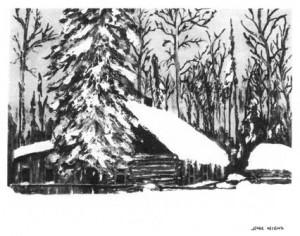
Front addition; summer kitchen and winter woodshed.
Small building to the right; our first barn.
In 1937, Dad built a larger barn.
I have put this story together as it has been related to me, and as I have conceived it from a number of sources, First of all from my parents, Anna and Jacob Wiens and also father John Friesen. I have the letter that Margaret Friesen wrote to Anna Wiens. In 1982, Edith and I met with Mrs. Mary Klassen, (nee Mary Wiebe) of Kitchener. She told us that she was a cousin of Margaret Wiebe Friesen, they grew up together in the Ukraine and that they had been close friends. She later also sent me some photographs.
There are stories that Reesor people told me. Henry Klassen related the following to me: “In those early years, we were neighbours to the Friesens. One day my brother John and I and the Schmidt boys, who were in our late teens and early twenties, were target shooting with a .22 calibre rifle. One of the bullets ricocheted, then careened into the top of the tree under which your mother was sitting, getting ready to shell some peas. The bullet stopped and trickled through the foliage and dropped straight into the empty bowl that she had set in front of her for the shelled peas. There it spun around and around until it finally settled in the middle of the bowl. I went over to her and asked her if she was frightened. If she was she did not show it. Your mother was a good sport. She just laughed it all off”. Then Henry’s brother Charlie told me “John, I remember rocking your cradle when “you were just a tiny little bit of a guy”. I rep1ied “Gee Charlie, that was a real act of kindness. I will be forever grateful to you. But did you change my diapers?” I should not have asked that question. He scowled at me, although I noticed a twinkle in his eyes. He said. “Johnny, I tolerated rocking your because my mother made me do it. I tolerated listening to your howling and screaming, but if you thought for a moment that I would change your smelly diapers, you better think again. That would have been doing something way below my dignity.”
Well, they were the kind of people we grew up with. God bless them! Not only am I forever grateful to Charlie and his mother, who made him rock my cradle, but also to all the gentle caring, sometimes also funny, folks who were the people of a wonderful community that once was Reesor.
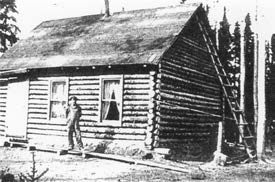
Dad, in front of his mansion.
